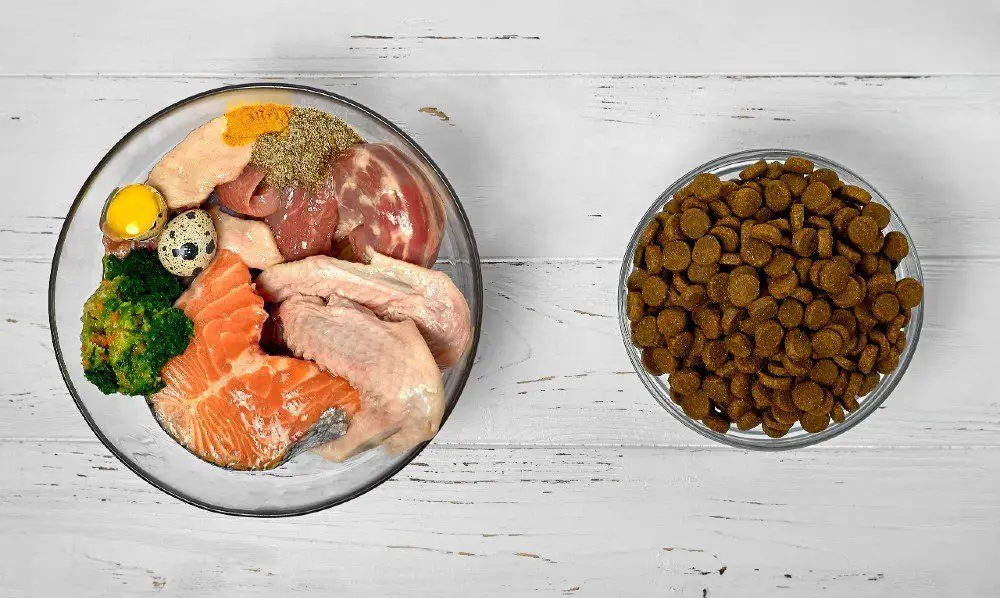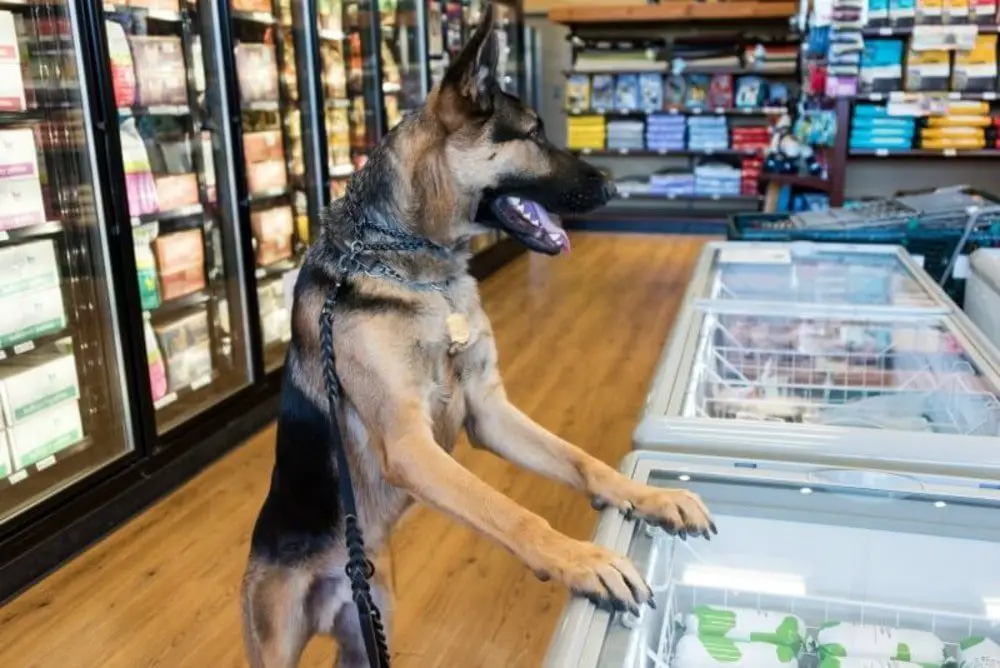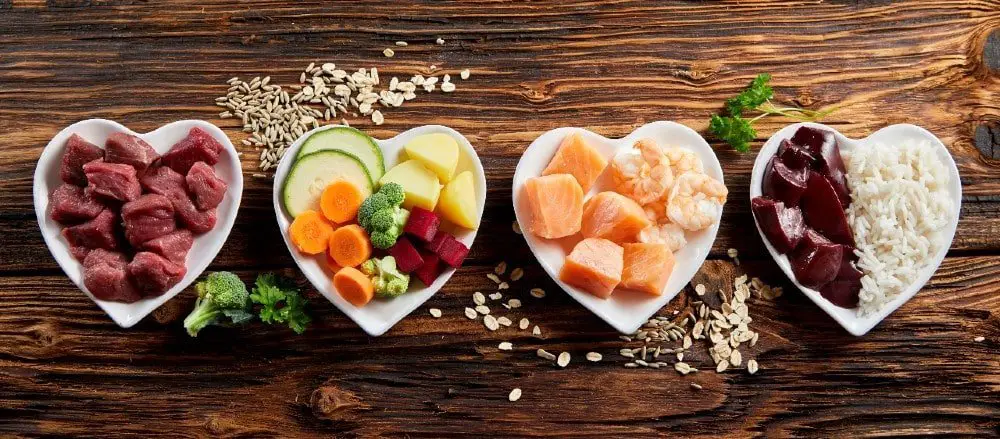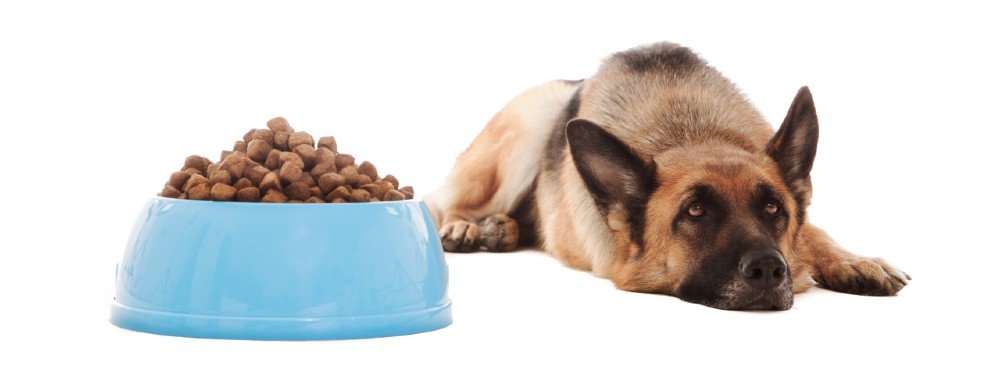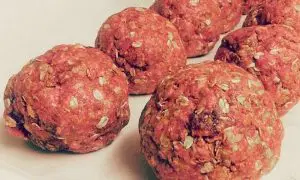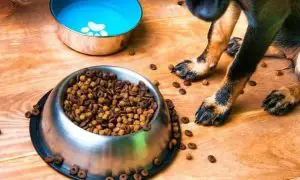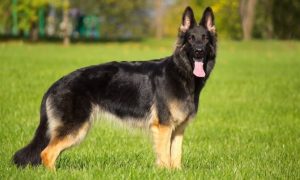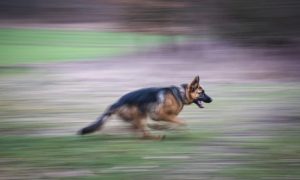The best dog food for your German Shepherd, or any breed, is an important question and topic for dog owners.
Gone are the days of feeding the family dog table scraps or fending for themselves in the neighbor’s garbage cans as the primary source of their diet.
Like humans, dogs thrive on good quality food in the correct quantity and on a regular schedule.
This article will explore the overall dietary needs of a large, active breed like the German Shepherd and specific dog food ingredients that help German Shepherds thrive.
Let’s explore the paw-fect diet for German Shepherds
How Much Food Should a German Shepherd Eat?
German Shepherds are a powerful breed, making them some of the biggest eaters too!
As you know, if you have a German Shepherd or if you are looking to get one, German Shepherds are highly active animals that need a lot of exercise and mental stimulation to be happy and healthy.
German Shepherds also need a balanced diet to supplement their activity levels.
Adult male German Shepherds weigh, on average, around 75 to 90 pounds, and a female German Shepherd weighs between 55 to 70 pounds.
The recommended calorie intake per day is for a puppy starts at a minimum of 500 calories. If you have a German Shepherd puppy, you will monitor and increase their food intake as they grow.
The recommended calorie intake per day is for a young and active German Shepherd is between 1,500 and 2,300 calories.
The recommended calorie intake per day is for an adult German Shepherd is roughly between 1,700 and 2,000 calories.
Senior German Shepherds become less active, and their calorie intake per day drops to around 1,200 to 1,400 calories per day.
It’s recommended to feed your German Shepherd twice per day, separating their daily food intake in half and feeding equal amounts in the morning and evening to help prevent bloat.
What is the Best Dog Food for German Shepherds?
The best dog food is a trick question and a slippery slope. There are no clear-cut, hands down best dog foods for German Shepherds or any breed for that matter.
The best dog food and diet are going to vary from dog to dog. Your German Shepherd’s food may need to be tweaked or changed as your dog transitions from a puppy to an adult to a senior or if your German Shepherd develops allergies or other health ailments as they age.
One of the essential things for German Shepherd puppies is a safe food for their age and development.
German Shepherds need calcium, but too much calcium in a German Shepherd puppies diet causes a higher risk of developing hip dysplasia.
German Shepherd puppies are growing until 12 to 24 months. These large breed pups aren’t ready for adult dog food until they have reached maturity.
There is a vast range of dog foods and brands which can be overwhelming and confusing for owners.
Options include dry food, wet food, raw food, organic food, fresh food, all-natural food, holistic food, low carbohydrate food, high protein food, grain-free food, puppy food, senior food, all life stages food, and the list goes on and on.
The bottom line is, though, German Shepherds need a specific balance of nutrients and ingredients.
The Best Dog Food Ingredients for German Shepherds
The three fundamental things a German Shepherd needs in their diet are protein, fiber, and fat.
1. Protein/Meat
Protein is a crucial element of any dog’s diet.
Larger breeds like the German Shepherd require lots of protein to keep their bones and muscles healthy and strong.
German Shepherd puppies need lots of protein to help build muscle and support their bones.
When checking dog food labels, the percentage of protein should be higher than other ingredients.
What Types of Protein Should I Feed my German Shepherd?
Protein sources that recommended for German Shepherds include:
- Meats, such as chicken, duck, turkey, pork, beef, bison, and lamb
- Fish, such as tuna (canned), salmon, herring, and cod
- Eggs
- Other sources of meat like kidneys and liver
2. Fiber
Just like humans, German Shepherds need fiber in their diet to have a healthy gut and reduce the chances of bowel issues.
Most high-quality dog foods (especially those designed for larger breeds) will contain the right amount of fiber for your German Shepherd – around 4% of their overall diet.
Sources of natural fiber for GSDs include:
- Plain vegetables and fruits, such as broccoli, carrots, asparagus, green beans, cabbage, apples (without seeds), berries, bananas, and cucumber
- Brown rice
- Ground Flaxseed
- Pumpkin
3. Fats and Other Essential Vitamins and Minerals
A German Shepherd puppy needs around 8% fat in their diet, while an adult GSD should have about 5% fat in their diet.
Natural fats from fish, meat, and plant-based oils contain beneficial properties that are great for your dog’s cognition and muscle movement.
These fats will also have visual benefits, as your German Shepherd’s coat will have a beautiful shine when they get enough fat and oil in their diet!
Because German Shepherds are a powerful breed of dog, their energy levels will be served well by feeding them dog food that contains a range of vitamins like Vitamin A, B12, and E.
What About Carbohydrates?
Carbohydrates in reasonable amounts are a source of energy for all living creatures.
However, carbohydrates are not nutritionally required in our dog’s diet for them to be robust and healthy.
It’s true. Many dogs thrive on raw diets consisting of protein, fats, and fiber. Dogs don’t nutritionally need corn, wheat, and other carb fillers found in inexpensive, low-quality dog food.
Dog food manufacturers love carbs because they are the meat and potatoes in making kibble. Carbs also give dry food a long shelf life and are cheaper per calorie than proteins or fats.
Carbs are not nutritionally needed to sustain a high-energy breed like a German Shepherd, but not all carbs are bad. The key is the source of the carbohydrate and the amount of carbs your dog consumes.
When choosing a commercial dog food, look for a low carb and high protein percentage. Slow-release carbohydrates are best for absorption and balanced energy levels for your German Shepherd.
The best resource to find a high-quality dog is Dog Food Advisor.
Dog Food Advisor
Dog Food Advisor independently reviews commercial dog food. You can search alphabetically. You can search by name, brand, category, or you can search by ratings.
Dog Food Advisor lists the ingredients and estimated nutrient content in every review. They have a 1 through 5-star rating system with 5 stars being the highest.
Here are some quick and easy Dog Food Advisor Resources:
- Dog Food for German Shepherds
- Large Breed Puppy Foods
- Dog Food for Large Breed Adults
- Dog Food for Seniors
- Dog Food for Allergies
Final Thoughts
German Shepherds are beautiful, intelligent, powerful animals with abundant energy. A healthy diet can prevent health ailments, extend your dog’s youthfulness and life span.
Most dogs live happy, healthy lives eating packaged dog food with no problems, but fresh ingredients are always better than processed foods.
Do your research, buy the best food that fits into your budget, expect some trial and error finding a diet you and your dog are happy with, and pat yourself on the back for finding the best dog food for your German Shepherd.


